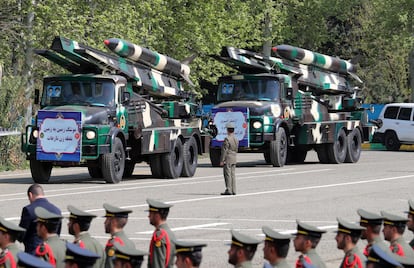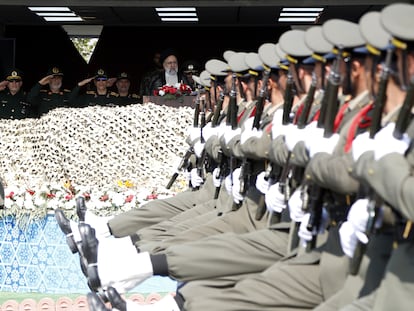Iran quickens path towards the atomic bomb
The Islamic Republic is closer than ever to possessing atomic weapons, but the regime insists that it does not intend to manufacture them

Iran’s interest in the atomic bomb dates back to before the Islamic Revolution. During the time of Mohammad Reza Pahlavi, who was an ally of the United States, Iran launched its first nuclear program. Almost a decade ago, the Islamic Republic made a commitment to the major world powers to curb its goals and eliminate 97% of its stockpile of enriched uranium. Today, the deal is broken, and after several years of expanding and accelerating its nuclear plans, Iran is closer than ever to possessing the bomb, although Iranian authorities deny that this is their intention. Should Tehran choose to develop the atomic bomb and assume the risks involved, its Armed Forces would probably begin to have nuclear capabilities in less than a year.
In 2015, Iran signed the so-called Joint Comprehensive Plan of Action with the U.S., France, the United Kingdom, Russia, China, Germany and the European Union. In exchange for the lifting of international sanctions that were strangling its economy, Tehran agreed not to enrich uranium above 3.65% purity, to keep its stockpile under 300 kilograms, and to submit itself to an unprecedented inspection regime. Less than three years later — when Iran was strictly complying with the rules —then-U.S. president Donald Trump unilaterally broke the nuclear pact, calling it “the worst deal ever.” Washington reimposed sanctions on Tehran and added new ones, in a bid to suffocate Iran’s oil industry.
After the U.S. broke the agreement, Iran no longer considered itself bound to follow the limits agreed to. It began to violate the restrictions and, shortly after, far exceeded the established limits. In 2021, it began to enrich uranium with 60% purity at the Natanz nuclear center, in Isfahan. This was the province targeted on Friday in an Israeli attack, with the Jewish state sending the message that it is willing (and able) to hit the centers of the Iranian nuclear program. Before the 2015 nuclear deal, Iran had not enriched uranium above 20%. A report from last February by the United Nation’s International Atomic Energy Agency (IAEA) indicates that Iran has more than five tons of enriched uranium, enough to manufacture at least two nuclear bombs if it reached 90% purity.
Matthew Savill, a researcher at the British think tank Royal United Services Institute (RUSI), argues that Iran could have uranium with the necessary concentration “in a matter of weeks; the question is how long it would take them to produce the necessary weaponry.” Savill adds that Iran would have to “develop a nuclear warhead and be able to integrate it, probably on a ballistic missile, to be able to deliver it.” The RUSI expert and several Western intelligence services agree that Tehran would probably need “between six months and a year” to complete the process.
Although Iran is closer than ever to possessing the atomic bomb, the regime insists that it does not intend to manufacture it and, for the moment, there is no evidence to show that it has decided to take definitive steps in that direction. After Trump broke the agreement, Iran has advanced steadily in its program, building up the material to develop an atomic bomb, although without making any move — at least openly — to actually build it. Iran has become the only country that has practically everything it needs to produce an atomic bomb but has not done so.

Since the Hamas attacks on October 7 and the start of the Israeli offensive in the Gaza Strip, uranium enrichment has accelerated in the Islamic Republic and the debate has intensified over whether — as some ultranationalist factions argue — the country should build the bomb. Hours before the Israeli attack last Friday, a commander of Iran’s Revolutionary Guard declared that the country would consider “reviewing its nuclear doctrine.” Tehran’s fear lies mainly in the possibility that the United States and Israel would bomb its nuclear facilities if it were discovered that they were working on a secret plan to manufacture atomic weapons.
For Israel, preventing Iran from obtaining nuclear bombs has been a strategic priority for decades. Both countries perceive each other as the main threats to their national security. During the years of shadow war, in which neither crossed the red line of directly attacking each other — as happened in the last week — Israel has tried to sabotage Iran’s atomic development, and the shadow of Mossad (Israel’s foreign espionage service) is behind the murder of several Iranian scientists who worked on the nuclear program. In April 2021, a cyberattack damaged the power grid at the Natanz facilities, just before it began to produce 60% enriched uranium. Israel — the only country that possesses nuclear bombs without publicly admitting it — never officially assumes responsibility for the attacks against Iranian interests, but neither does it deny it is behind them.
The Spanish-Iranian analyst Daniel Bashandeh believes that the latest events in the region may have the opposite effect to that intended by Israel and the United States. Iran could now “accelerate the nuclear issue as a last resort to protect itself. The country may refocus attention on its nuclear program as a deterrent measure and to counter Israel’s intentions to condition the international agenda.”
Technically, the nuclear pact is still in force, although even U.S. president Joe Biden described the deal as “dead.” Biden tried to resurrect some clauses upon arriving at the White House, but unlike during the 2015 negotiations, Iran’s supreme leader, Ayatollah Ali Khamenei, prohibited any form of direct communication with Washington.
Restrictions on inspections
IAEA inspectors still have access to the atomic facilities recognized by Tehran: those in Natanz and in Fordow, an underground complex built on a mountain in the Kavir desert. But the erosion of the nuclear deal has completely limited the IAEA’s ability to adequately monitor the Iranian program. The agency’s workers can no longer carry out surprise inspections, access certain parts of the facilities or take inventory of the centrifuges, the machines that enrich uranium.
The Iranian authorities have also removed countless cameras and sensors and vetoed access to some inspectors from “hostile countries.” In recent years, they have expanded their uranium enrichment centers, mainly underground, in addition to tightening their security. In the spring of 2023, satellite images showed the construction of a new fortified complex deep underground at Natanz.
The nuclear deal will definitively expire in October next year. Even if Trump does not return to the White House, the chances of the U.S. reaching a new agreement with the Islamic Republic appear remote. In the 2015 negotiations, Russia and China joined the efforts of Western powers to get Iran to abandon its nuclear goals. Now, Tehran is aware that Beijing, and especially Moscow, would block any move to impose new international sanctions on Iran in the U.N. Security Council. Some analysts argue that Iran’s closer relations with Russia — which it supplies drones for the war in Ukraine — has emboldened the country.
Barbara Slavin, a researcher at the Stimson Center, argues that “nuclear nonproliferation experts are desperately seeking new ideas to avoid what some have called the binary choice between bombing Iran or Iran having the bomb.” The analyst from the American research center emphasizes that “diplomacy is the only way to contain the Iranian nuclear program. If there ever was a military solution, which I doubt, it no longer exists.” Slavin believes that, after Israel’s “very restrained attack” on Friday, “Iran is not going to rush to make a nuclear bomb.”
Sign up for our weekly newsletter to get more English-language news coverage from EL PAÍS USA Edition








































